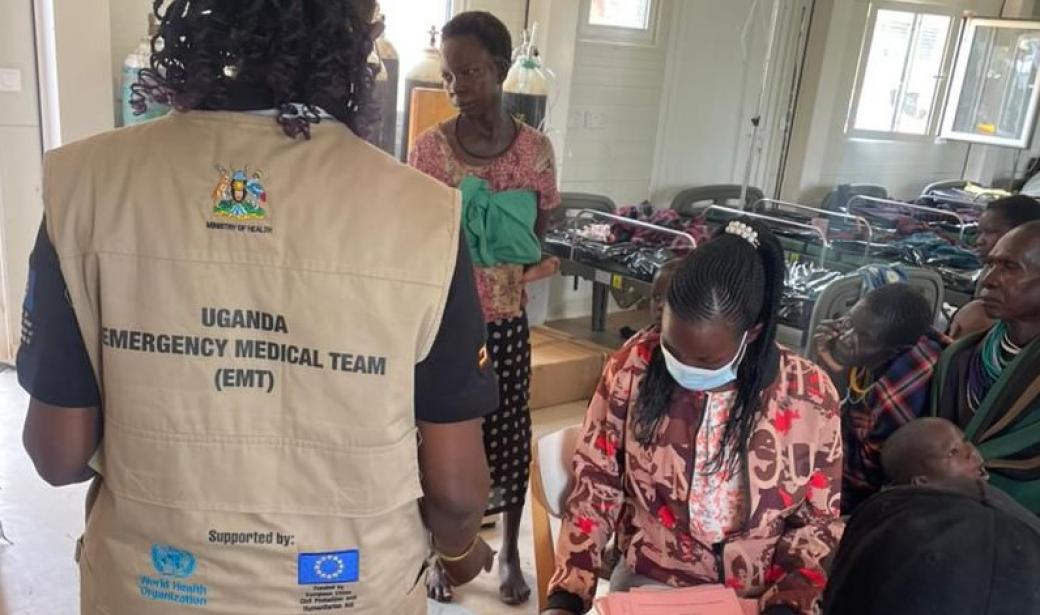Moroto-Uganda’s Ministry of Health (MoH), with support from the World Health Organization (WHO, Malteser International, and Hiroshima University deployed the national Emergency Medical team (nEMT) to provide critical support in responding to a measles outbreak in Moroto district, Karamoja region, northeastern Uganda.
Located over 400 kms from Kampala capital city, Karamoja region has over 1.2 million inhabitants. The region has the highest food insecurity and malnutrition levels in the country, a high burden of communicable and non-communicable diseases, and high mortality rate. The 126 health facilities serving the region are not fully equipped to meet the population's health needs.
Since the beginning of 2024, sporadic outbreak incidents of measles have been confirmed in several districts across Uganda including Moroto. However, the one in Moroto has been most severe with over 200 cases and six deaths as of 18 July 2024.
In the first week of July, MoH deployed a five-member nEMT to Moroto district, to support the local healthcare system in providing clinical care, for 21 days, to children affected by the measles outbreak. The team comprised one pediatrician, a medical officer, a nutritionist, a critical care nurse, and an infection prevention and control (IPC) trained nurse.
“The deployment has given us the opportunity to draw lessons on how to improve case management response during public health emergencies. It is proof that the national EMT initiative works and is worthy of investment from the government and development partners,” said Dr. Rony Reginald Bahatungire, Ag. Commissioner Clinical Services and EMT National Focal Point, Ministry of Health.
The team increased bed capacity of the Measles Treatment Unit (MTU) at Moroto regional referral hospital by pitching a temporary 12-bed unit tent, in addition to setting up screening points at the hospital entrances, installing handwashing points, setting up nutrition assessment and treatment areas within the MTU and ensuring that each patient has a daily nutrition assessment and plan. The team also undertook 24-hour patient care including close monitoring for the severe and critical cases.
In addition to the clinical care, mothers whose children were admitted to the MTU received counselling and health education courtesy of the nEMTs. The focus was mainly on vaccination, breastfeeding, complementary feeding, environmental and hand hygiene, and appropriate feeding practices.
The nEMTs mapped out health facilities and designed an evacuation and referral pathway for measles cases. This ensured prompt case recognition and management, in addition to timely referral of critical cases to higher levels of care. Team members also supported the second Measles treatment unit at St. Pius Kidepo Health Centre III that manages mild cases, through trainings in basic emergency care skills including oxygen use, resuscitation practices, nutrition assessment, IPC, and documentation. They have also worked hand-in-hand with the Moroto regional referral hospital health workers to further build their capacity and ensure a smooth transition and continuity of care for patients.
Since deployment of the nEMTs, Moroto regional referral hospital MTU has cumulatively managed 135 cases with six deaths, one referral and 65 children discharged (as of 22 July 2024). Relatedly, St. Pius Kidepo HCIII has managed 50 cases over the same period. The overall measles outbreak case fatality rate in Moroto district is at 3.3%.
Uganda currently has 107 nEMT members, readily available to support the health system in providing direct clinical care to communities affected by disasters and public health emergencies. The nEMT concept dates to December 2021 during the COVID-19 pandemic. At the time, MoH, with support from WHO, hosted the first regional training for national EMT members to support the COVID-19 response. MoH continued to build the team through additional trainings and drills supported by WHO with funding from partners like the European Union Humanitarian Aid Agency (DG ECHO), the Robert Koch Institute and Malteser International among others.
“Public health emergencies can quickly overwhelm the local health system necessitating additional support. Fortunately, national EMTs understand the local context and are readily deployable to support affected communities,” said Dr. Yonas Tegegn Woldemariam, WHO Representative to Uganda.
In July 2024, MoH approved the national EMT roadmap that will provide guidance for further development of the EMT initiative in Uganda. A secretariat composed of representation from MoH and WHO, will oversee implementation of the roadmap and establishment of a national team and six regional EMT teams to decrease response time. The global EMT initiative aims to improve the timeliness and quality of health services provided by national and international EMTs and enhance the capacity of national health systems to lead the activation and coordination of emergency response in the immediate aftermath of a disaster, outbreak, and other emergencies.
Communications Associate
WHO Uganda
Email: afwcougcom [at] who.int (afwcougcom[at]who[dot]int)
Communications Officer
WHO Uganda
Email: tcheutchouae [at] who.int (tcheutchouae[at]who[dot]int)



